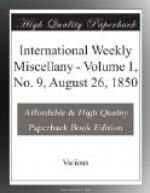We glory in about sixty whose busts and statues may occupy what are now the “deep solitudes and awful cells” in our national gallery. Our literary men of eminence are happily more numerous than the political or the warlike, or both together. There is only one class of them which might be advantageously excluded, namely, the theological; and my reasons are these. First, their great talents were chiefly employed on controversy; secondly, and consequently, their images would excite dogmatical discord. Every sect of the Anglican Church, and every class of dissenters, complaining of undue preferences. Painture and sculpture lived in the midst of corruption, lived throughout it, and seemed indeed to draw vitality from it, as flowers the most delicate from noxious air; but they collapsed at the searching breath of free inquiry, and could not abide persecution. The torch of Philosophy never kindled the suffocating fagot, under whose smoke Theology was mistaken for Religion. Theology had, until now, been speculative and quiescent: she abandoned to Philosophy these humbler qualities: instead of allaying and dissipating, as Philosophy had always done, she excited and she directed animosities. Oriental in her parentage, and keeping up her wide connections in that country, she acquired there all the artifices most necessary to the furtherance of her designs: among the rest was ventriloquism, which she quite perfected, making her words seem to sound from above and from below and from every side around. Ultimately, when men had fallen on their faces at this miracle, she assumed the supreme power. Kings were her lackeys, and nations the dust under her palfrey’s hoof. By her sentence Truth was gagged, scourged, branded, cast down on the earth in manacles; and Fortitude, who had stood at Truth’s side, was fastened with nails and pulleys to the stake. I would not revive by any images, in the abode of the graceful and the gentle Arts, these sorrowful reminiscences. The vicissitudes of the world appear to be bringing round again the spectral Past. Let us place great men between it and ourselves: they all are tutelar: not the warrior and the statesman only; not only the philosopher; but also the historian who follows them step by step, and the poet who secures us from peril and dejection by his counter-charm. Philosophers in most places are unwelcome: but there is no better reason why Shaftesbury and Hobbes should be excluded from our gallery, than why Epicurus should have been from Cicero’s or Zeno from Lucullus’s. Of our sovereigns, I think Alfred, Cromwell, and William III alone are eligible; and they, because they opposed successfully the subverters of the laws. Three viceroys of Ireland will deservedly be placed in the same receptacle; Sir John Perrot, Lord Chesterfield, and (in due time) the last Lord-Deputy. One Speaker, one only, of the Parliament; he without whom no Parliament would be now existing; he who declared to Henry IV. that until all public grievances were removed, no subsidy should be granted. The name of this Speaker may be found in Rapin; English historians talk about facts, forgetting men.




